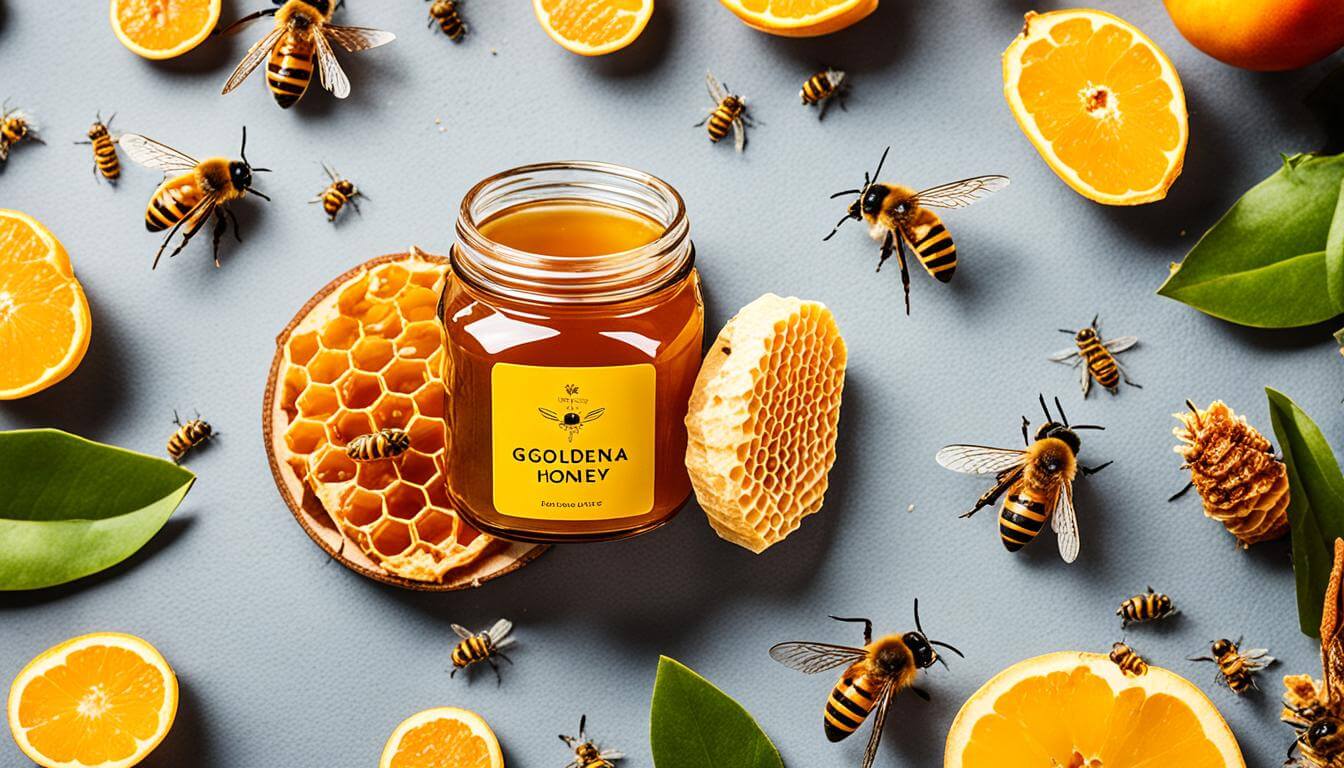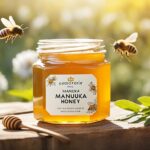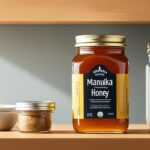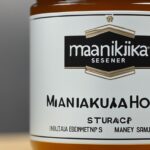Discovering the multifaceted health benefits of Manuka honey may be one of the most delightful surprises in the realm of holistic health. This golden elixir, often hailed as a medicinal honey, is brimming with attributes that have caught the attention of both health enthusiasts and scientific communities alike. But what distinguishes Manuka from the honey found in your local market, and how can it contribute to your well-being?
Within this comprehensive guide, we delve deep into the world of Manuka honey to uncover its secrets. Here’s where nature’s sweetness meets potent healing powers, offering a plethora of natural remedies that transcend the limitations of conventional wellness approaches. As we explore, you’ll find that Manuka isn’t just a treat for your taste buds; it’s a testament to nature’s incredible pharmacy.
Embark on this journey with us as we peel back the layers of mystery surrounding Manuka honey and reveal why it’s becoming an integral part of holistic health practices around the globe. Sweet discoveries await!
What is Manuka Honey and How Is It Different?
New Zealand Manuka honey has captured the attention of health enthusiasts around the world, distinguished by its unique Manuka factor and the compelling history of its honey production. Originating from the nectar of the Leptospermum scoparium bush—often called the Manuka bush—this honey is produced in New Zealand and, to a lesser extent, in Australia. Its unique properties stem from the nectar of these bushes, which imbues the honey with a distinctive flavor and enhanced health benefits not found in traditional honey varieties.
What truly makes Manuka honey stand apart is the presence of methylglyoxal (MG), a compound that is found in higher levels in Manuka honey than in any other type. The concentration of MG gives Manuka honey its potent antibacterial properties, qualifying it as a superior variety among other types of honey. This has been confirmed through rigorous scientific research, adding credibility to the various health claims associated with its consumption.
When it comes to appreciating the full scope of what makes Manuka honey special, it is crucial to understand the Unique Manuka Factor (UMF). This grading system measures the purity and quality of Manuka honey, considering factors like MG content and dihydroxyacetone, another compound found in the nectar of Manuka flowers. The higher the UMF rating, the stronger the antibacterial effect and, thus, the more coveted the honey.
The table below provides a comparison of Manuka honey’s unique constituents with those of standard honey:
| Constituent | Manuka Honey | Standard Honey |
|---|---|---|
| Methylglyoxal (MG) | High | Low |
| Hydrogen Peroxide | Low | High |
| Dihydroxyacetone | Present | Absent |
| UMF Rating | Varies (5+, 10+, 15+, etc.) | Not Applicable |
| Leptosperin | Present | Absent |
| Taste | Rich, Earthy, More Robust | Sweeter, Milder |
To conclude, New Zealand Manuka honey offers an extraordinary suite of benefits that reach far beyond the scope of ordinary honeys. With its scientifically-backed unique Manuka factor and the remarkable pedigree stemming from the nectar of the Leptospermum scoparium, it represents the zenith of honey production. Whether seeking a health supplement or a rich, flavorful addition to a culinary creation, Manuka honey stands as a prime example of nature’s generosity.
The Health and Wellness Powerhouse: Manuka Honey Benefits
Delving into the myriad of health benefits offered by Manuka honey, it becomes clear why this natural product stands out in the world of health supplements. Renowned for its potent antibacterial properties, Manuka honey has been leveraged for both internal and external applications, ushering in a wave of natural healing options for those looking to augment their health routines. Scientific studies have consistently illustrated Manuka honey’s efficacy, while health professionals endorse its anti-inflammatory benefits, marking it as an exemplary holistic health resource.
- Utilization as a topical agent for wounds and burns, harnessing its antibacterial prowess.
- Consumption to soothe sore throats and digestive complaints due to its soothing texture and medicinal qualities.
- Inclusion in daily diets to leverage its health-promoting nutrients, serving as alternative medicinal honey.
- Adoption by athletes for its natural endurance-enhancing properties and energy-boosting carbohydrates.
Essential to understanding the full scope of Manuka honey’s capabilities are the testimonials from those who have integrated it into their wellness practices. Beyond anecdotal evidence, the growing body of scientific research grounds these benefits in quantifiable data, shedding light on the inherent properties that make Manuka honey a staple in health-conscious communities.
| Health Benefit | Description | Supporting Evidence |
|---|---|---|
| Antibacterial Efficacy | Manuka honey’s unique enzyme, methylglyoxal, provides robust antibacterial action against numerous pathogens. | Various clinical studies show reduction in bacterial infections, particularly in wound care. |
| Anti-inflammatory Action | Known to reduce inflammation, helping in the case of sore throats or internal inflammation. | Research indicates decreased inflammatory markers in patients with inflammatory ailments. |
| Oral Health Improvement | When used in moderate quantities, it can contribute to oral health benefits without harming tooth enamel. | Studies have shown a reduction in plaque formation and gum inflammation. |
| Digestive Benefits | The prebiotic effects of Manuka honey can promote a healthy gut microbiome. | Subject groups have reported improved digestion and fewer gastrointestinal symptoms. |
Overall, Manuka honey offers a synergistic blend of health benefits, backed by scientific validation, propelling it to the forefront of natural healing and holistic health supplements.
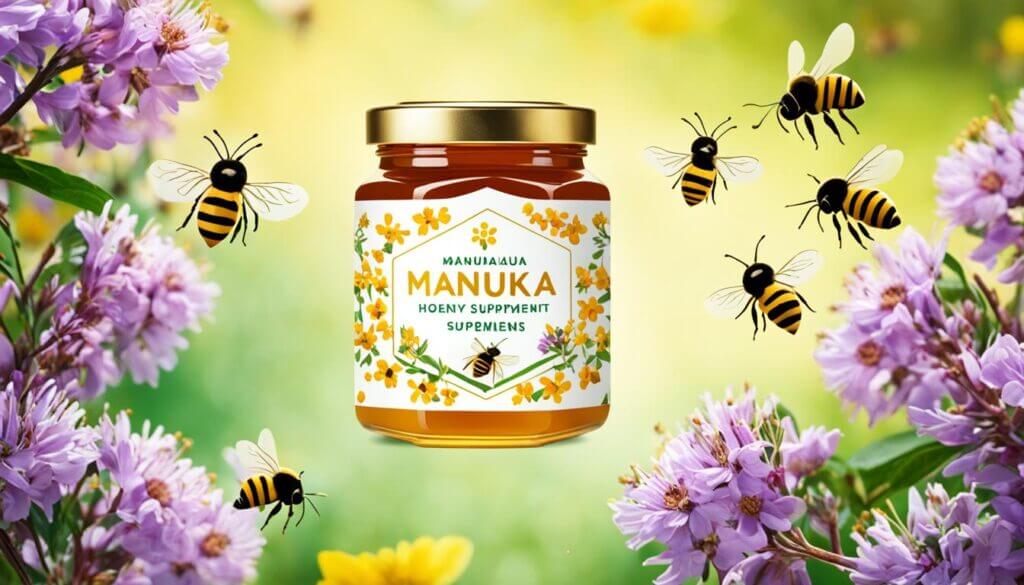
Natural Beauty Enhancer: Using Manuka Honey in Skincare
The virtue of Manuka honey extends beyond its dietary sweetness; it’s a burgeoning staple in the realm of organic skincare. Renowned for its hydration capacity, Manuka honey functions effectively as a natural moisturizer, alleviating dry skin without the additives found in traditional cosmetic products. But the benefits of this nectarous treasure don’t end there—it also serves as a potent ally in acne treatment and skin repair, thanks to its natural antimicrobial properties and tissue-regenerating capabilities.
Integrating this powerful honey into your skincare routine can be both indulgent and beneficial. To simplify how Manuka honey can rejuvenate and restore skin health, consider the following table that compares it to standard skincare ingredients:
| Skincare Concern | Manuka Honey | Traditional Treatments |
|---|---|---|
| Dry Skin | Deeply hydrating, retains moisture | Often contain alcohol, which can be drying |
| Acne | Antibacterial, anti-inflammatory | May contain harsh chemicals that irritate skin |
| Scars and Repair | Supports skin’s own repair process, reduces scarring | Typically rely on synthetic ingredients to aid skin healing |
| Eczema and Irritation | Soothes irritation, reduces inflammation | Can contain irritants, exacerbating conditions |
For those interested in incorporating Manuka honey into their skincare regimen, follow these organic approaches:
- Create a Manuka honey mask by applying a thin layer of honey to the face, leaving it on for 15-20 minutes before rinsing with warm water.
- Use it as a spot treatment for acne by dabbing a small amount of honey on blemishes.
- Blend it with oats for an exfoliating yet soothing scrub suitable for sensitive skin.
Whether you’re looking for a product that assists in skin repair or you wish to maintain supple, moisturized skin naturally, Manuka honey is an exceptional, multi-faceted agent in organic skincare. By privileging its use, your skin can reap the benefits of a natural elixir, harvested with purity and applied with the intent to heal and enhance.
Manuka Honey in Integrative Medicine
As the terrain of healthcare continues to expand, holistic health care and alternative medicine practitioners are increasingly recognizing the virtues of integrating traditional therapies with natural remedies. At the forefront of this integration is the venerable Manuka honey, a substance esteemed not only for its richness in flavor but also for its potent supportive properties. Renowned for enhancing digestive health and providing robust immune system support, Manuka honey is becoming a cornerstone ingredient in the practice of integrative medicine.
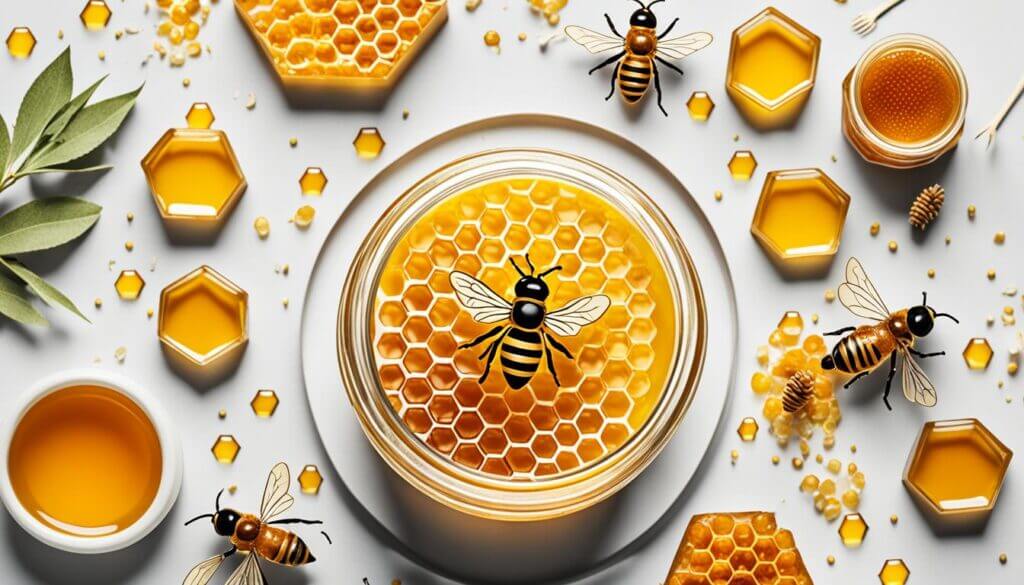
In the realm of digestive wellness, Manuka honey has been found to play a supportive role. Its natural prebiotic qualities contribute to a healthy gut biome, which is a key factor in overall wellness and metabolism. Clinical research suggests that the regular consumption of Manuka honey may help soothe inflammation in the digestive tract, offering relief to those with discomfort.
When it comes to bolstering the immune system, Manuka honey’s benefits are doubly significant. Its antibacterial properties aid in fighting off pathogens, while its antioxidant components help combat oxidative stress, an adversary to immune resilience. Here are a few applications in which Manuka honey is utilized within integrative medicine approaches:
- Adjunct treatment alongside medications to enhance gastrointestinal recovery.
- Daily dietary inclusion for natural prebiotic effect, promoting a balanced gut microbiota.
- Support during cold and flu season as a natural antimicrobial agent.
Integrative medical practitioners continually seek evidence-based methods to provide comprehensive care that addresses both symptoms and underlying causes of discomfort. Manuka honey’s unique profile, backed by emerging clinical research, makes it a valuable ally in this quest. This esteemed natural product represents a confluence of taste, tradition, and therapeutic benefit—a veritable nectar of holistic health practices.
Manuka Honey Benefits for Oral Health
In recent years, the use of Manuka honey has extended beyond the pantry and into the realm of dental care, where it is being recognized for its natural antiseptic properties. Renowned for its effectiveness in fighting dental plaque and promoting gum health, this natural product is gaining the attention of dental professionals and consumers alike. Manuka honey’s high antibacterial activity is attributed to its unique makeup, which is distinct from regular honeys. This beneficial trait comes from an ingredient known as methylglyoxal (MGO), which is present in high concentrations in Manuka honey and is often linked with its antibacterial effects.
Below is an overview of how incorporating Manuka honey into your oral hygiene routine can be beneficial:
- Fighting Dental Plaque: Studies have shown that the antibacterial properties of Manuka honey are effective in inhibiting the growth of harmful bacteria that contribute to the formation of plaque.
- Gum Health: The anti-inflammatory benefits of Manuka honey help in reducing redness and swelling of the gums, contributing to overall gum health and prevention of gum disease.
- Natural Antiseptic Qualities: When used as a mouthwash or a topical application on sore gums, Manuka honey acts as a natural antiseptic, soothing the affected area and reducing infection risks.
- Preventing Tooth Decay: Its use in small quantities may contribute to a lower incidence of cavities due to its antimicrobial constituents, which attack the bacteria responsible for tooth decay.
For a better understanding of how Manuka honey compares with other oral hygiene products, consider the table below:
| Aspect of Oral Care | Manuka Honey | Traditional Oral Care Products |
|---|---|---|
| Antibacterial Properties | High antibacterial activity due to MGO | Dependent on chemical antiseptics like triclosan |
| Gentleness on Mouth Tissues | Soft and soothing with natural healing compounds | Can sometimes cause irritation or dryness |
| Contribution to Dental Health | Promising results in plaque and gingivitis reduction | Proven effectiveness with regular use |
| Chemical Additives | Free from artificial chemicals and preservatives | May contain synthetic flavors, colors, and preservatives |
While Manuka honey is not a replacement for regular brushing and flossing, or for professional dental care, its addition to oral health routines can provide a complementary approach that supports the natural maintenance of a healthy mouth. Whether used in moderation as a sweetener, as a constituent in homemade mouthwash, or directly applied, Manuka honey has the potential to enhance oral health and hygiene.
Boosting Immunity with Manuka Honey
Manuka honey is not just a sweetener; it’s a veritable force in supporting the body’s defenses, especially during cold and flu season. Its unique antiviral and antibacterial properties make it a compelling natural remedy for keeping your immune system robust. Integrating Manuka honey into your daily routine could be a game-changer when it comes to cold and flu prevention and offering throat soothing relief.

When you’re seeking natural ways to bolster your immunity, Manuka honey’s benefits are manifold. Not only does it possess compounds that can help fight off threats, but it also nurtures the body with its nutrient-rich composition. Below is an outlined exploration of how Manuka honey serves as an immune booster, complements cold and flu prevention strategies, and acts as a go-to for natural throat soothing.
- Immune System Fortification: Regular consumption of Manuka honey is associated with enhanced immune function, thanks to its high concentration of beneficial compounds like methylglyoxal.
- Antiviral Action: Scientific studies have shown Manuka honey to inhibit certain viruses, making it a valuable ally during cold and flu seasons.
- Antibacterial Properties: Manuka honey is known for its strong antibacterial effects, even having potential against antibiotic-resistant strains, thus keeping common bacterial infections at bay.
- Throat Comfort: A spoonful of Manuka honey can provide soothing relief for a sore throat, making it an effective and natural remedy for throat discomfort.
- Supportive Nutrition: With its rich content of vitamins, minerals, and antioxidants, Manuka honey not only tastes good but contributes to overall nutrition—a vital aspect of immune health.
Let’s delve deeper into how Manuka honey works as an immune booster by examining its throat soothing potential during a cold, shown in the table below:
| Manuka Honey Attribute | Throat Soothing Benefit | Supporting Evidence |
|---|---|---|
| Antibacterial Activity | Reduces throat infection | Clinical studies have demonstrated Manuka honey’s ability to diminish the presence of harmful bacteria. |
| Anti-inflammatory Effect | Alleviates swelling and pain | The anti-inflammatory properties of Manuka honey help in reducing throat inflammation, providing comfort. |
| Osmotic Effect | Draws out inflammation and toxins | Manuka honey’s natural osmotic effect can ease throat tissue swelling by drawing out excess fluid. |
| Natural Hydrating Properties | Moisturizes dry, irritated throat tissues | Its humectant qualities promote moisture retention, aiding in the healing process of throat tissues. |
In conclusion, Manuka honey stands out as a multifaceted natural remedy that can play a significant role in an immune-boosting regimen. From soothing a scratchy throat to arming the immune system against pathogens, Manuka honey’s benefits make it a valuable addition to any wellness strategy. As with any natural remedy, quality and authenticity in sourcing Manuka honey are paramount to ensure the best therapeutic outcomes.
Nutritional Profile of Manuka Honey
Manuka honey is renowned not just for its distinctive flavor but also for its impressive nutritional profile. As a healthy sweetener, this honey variant is packed with essential vitamins and minerals that contribute to its status as a potent energy source. Below is an in-depth look into the nutrients found in Manuka honey and how they bolster its health-enhancing properties.
- Vitamins: Manuka honey contains crucial vitamins like B6, thiamine, niacin, riboflavin, pantothenic acid, and amino acids, which are the building blocks of proteins.
- Minerals: It boasts a range of minerals including calcium, copper, iron, magnesium, manganese, phosphorus, potassium, and zinc, crucial for body processes.
- Amino acids: Manuka honey is a good source of amino acids, which are vital for tissue repair, muscle growth, and immune function.
The table below provides a further breakdown of the specific vitamins and minerals in Manuka honey, reflecting its status as a nutrient-dense health food.
| Nutrient | Benefit |
|---|---|
| B6 (Pyridoxine) | Supports energy release from foods and hormone regulation |
| Thiamine (Vitamin B1) | Essential for glucose metabolism |
| Niacin (Vitamin B3) | Improves cholesterol levels, supports skin health, and aids in brain function |
| Riboflavin (Vitamin B2) | Required for energy production, cellular function, and metabolism |
| Pantothenic Acid (Vitamin B5) | Assists in fatty acid synthesis and energy production |
| Calcium | Strengthens bones and plays an important role in muscle function |
| Phosphorus | Works with calcium to build strong bones and teeth |
| Potassium | Regulates fluid balance, nerve signals, and muscle contractions |
| Zinc | Crucial for immune function, wound healing, and DNA synthesis |
Furthermore, Manuka honey’s rich array of antioxidants adds to its reputation as a healthful addition to any diet. Whether used as a sweetener in tea or drizzled over your morning yogurt, incorporating this multi-faceted honey into your routine can be an easy step towards enhanced wellness.
Manuka Honey Benefits for Sustainable Weight Management
Embarking on a journey of weight management can be both challenging and rewarding. Integrating healthy carbohydrates into one’s diet is a crucial aspect of this journey. Manuka honey, with its natural sweetness, not only offers a delicious alternative to processed sugars but also hosts benefits that can provide weight loss support.
In the dialogue of weight loss and healthy eating, the glycemic index (GI) plays a pivotal role. Foods with a low to moderate GI are digested slower, providing a steadier release of energy, which can help in appetite control by preventing rapid spikes in blood sugar levels that lead to hunger pangs. Manuka honey exists in this low to moderate GI range, making it a friendly companion for those looking to manage their weight effectively.
- Substituting high GI sweeteners with Manuka honey can help avoid the ‘sugar crash’ that often leads to snacking and overeating.
- As a rich source of healthy carbohydrates, Manuka honey can serve as a balm for sweet cravings without the guilt associated with refined sugars.
- The natural sugars in Manuka honey are balanced with enzymes and nutrients that promote a healthy metabolism.
Managing weight doesn’t just imply ‘eating less’; it needs an understanding of eating right. A strategic approach to incorporate Manuka honey in moderation can bolster a diet in multiple ways, aiding efforts for sustainable weight control while delighting the palate with its unique flavor.
Understanding the MG, UMF, and KFactor Ratings in Manuka Honey
When you’re on the hunt for authentic Manuka honey, navigating the myriad of grading scales can be confusing. It’s pivotal to comprehend the Manuka honey grading system to ensure the honey quality you invest in truly reflects the sought-after active compounds known for their health benefits. Here’s a breakdown of the most fundamental ratings you’ll encounter.
The MG (methylglyoxal) rating measures the concentration of methylglyoxal, an active compound that contributes to Manuka honey’s potent antibacterial properties. The higher the MG rating, the stronger the antibacterial effect.
The UMF (Unique Manuka Factor) rating goes beyond just MG; it also accounts for additional elements like leptosperin and dihydroxyacetone. Ranging from UMF 5+ to UMF 20+, it’s a comprehensive indicator of honey’s purity and quality.
KFactor, on the other hand, evaluates the purity of the honey based on pollen count, ensuring it’s a true representation of the Manuka plant. KFactor also guarantees non-GMO and raw status, contributing to the overall authenticity of the product.
To assist you in deciphering these ratings, here’s a comparative table that highlights their distinctions:
| Rating Type | What It Measures | Range | Indication |
|---|---|---|---|
| MG (Methylglyoxal) | Concentration of methylglyoxal | 100+ to 1000+ mg/kg | Antibacterial strength |
| UMF (Unique Manuka Factor) | Total purity and quality including MG, leptosperin, and DHA | 5+ to 20+ | Overall potency and authenticity |
| KFactor | Pollen count, raw and non-GMO status | 12 to 22 | Purity reflecting the Manuka plant |
Armed with this understanding of the Manuka honey grading system, you can make more informed decisions and enjoy the unique benefits of authentic Manuka honey.
Incorporating Manuka Honey into Your Diet
Discovering the savory and sweet potential of Manuka honey to elevate your dishes is a delectable journey. Not only is Manuka honey valued for its potential health benefits, but it also serves as a versatile ingredient in the kitchen. Let’s explore how you can integrate this natural sweetener into your daily consumption and take advantage of its unique taste and culinary uses.
To get started, consider how Manuka honey can replace refined sugars in your recipes. Whether you’re concocting a morning smoothie, a batch of homemade granola, or a glaze for your favorite roasted vegetables, Manuka honey’s rich, earthy flavor pairs well with a myriad of foods. For those who are enthusiastic about optimizing their wellness routine, incorporating Manuka honey recipes into your diet can be both nourishing and enjoyable.
- Smoothie Sweetener: Add a spoonful of Manuka honey to your daily smoothie for an extra touch of sweetness and a boost of energy.
- Yogurt Parfait: Drizzle Manuka honey over a bowl of Greek yogurt topped with fresh fruit and nuts for a delightful breakfast or snack.
- Salad Dressing: Whisk together Manuka honey, olive oil, apple cider vinegar, and mustard to create an aromatic vinaigrette.
- Tea Enhancer: Stir Manuka honey into your herbal teas as a natural sweetener with added health benefits.
- Baking Replacement: Substitute sugar with Manuka honey in baking recipes, keeping in mind to reduce the amount of liquid elsewhere.
Ready to try some creative Manuka honey recipes? Here’s a simple one to start with:
- Honey-Cinnamon Overnight Oats:
- 1/2 cup rolled oats
- 2/3 cup almond milk
- 1 tablespoon Manuka honey
- 1/2 teaspoon cinnamon
- A pinch of salt
- Your choice of toppings: sliced bananas, berries, almonds
To prepare, mix the oats, almond milk, Manuka honey, cinnamon, and salt in a jar. Seal and let it sit overnight in the refrigerator. In the morning, give it a good stir, add your toppings, and enjoy a wholesome, energy-packed breakfast.
Embracing Manuka honey in its culinary versatility isn’t solely about its unique taste or even its potential wellness benefits; it’s also about conscious consumption. By integrating Manuka honey into your diet, you’re choosing a product that’s considered a pinnacle of natural sweetness and a testament to sustainable beekeeping practices.
The final note on its daily consumption: as with any sweetener, moderation is key. While Manuka honey brims with benefits, it remains a form of sugar, so mindful, balanced intake will ensure you enjoy all its qualities responsibly.

Conclusion
The exploration of Manuka honey reveals its prestigious standing as not just an ordinary sweetener but a potent natural superfood. It is a gem in the domain of holistic nutrition, flourishing with the capacity to imbue our lives with a myriad of health advantages. The journey through the health benefits of Manuka honey has illuminated its remarkable anti-inflammatory and antibacterial properties, spotlighting the ways it supports wellness from digestive health to skincare and beyond.
A proactive health management plan can certainly draw from the plethora of Manuka honey remedies discussed, each substantiating Manuka honey’s role in fostering an enhanced state of health. Whether it’s through aiding oral hygiene, bolstering immunity, or as an integrative force in medicinal practices, Manuka honey remains a stellar ally in the pursuit of optimal health. Moreover, its nutritional abundance fortifies its status as a holistic staple, offering an array of vitamins, minerals, and antioxidants.
In conclusion, when integrating this remarkable gift of nature into your regimen, remember that quality is paramount. Opt for Manuka honey products with credible ratings indicative of their purity and potency. Embrace the savory and therapeutic excellence of Manuka honey and let it be a transformative element in your proactive health management approach, ensuring an enriching and savory path towards wellness.
